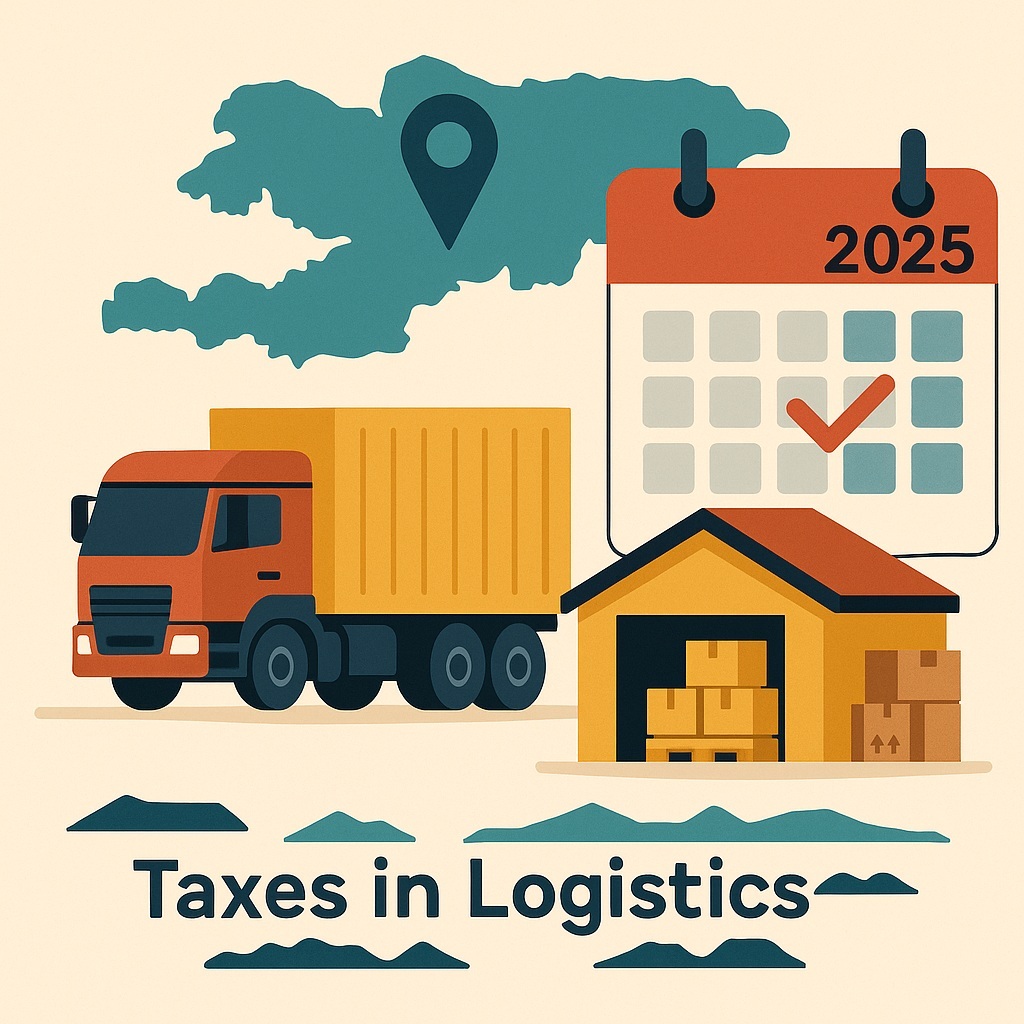The logistics industry in Kyrgyzstan in 2025 is developing dynamically thanks to the strategic location of the country in Central Asia and membership in the EAEU (Eurasian Economic Union). Carriers and warehouse companies face the need to comply with tax rules in order to minimize costs and avoid fines. In this article we will consider taxes, benefits, and reporting for this sector.
Main taxes in the logistics industry
The tax legislation of Kyrgyzstan offers several regimes suitable for logistics: general regime, simplified (single tax), and patent. Logistics companies (cargo carriers, freight forwarders, warehouse operators) fall under these regimes, but with specifics — transport services are often connected with VAT, and warehouses — with property tax.
VAT (value added tax):
- Rate: 12% of the cost of services or goods.
- Application: Mandatory for companies with turnover over 30 million soms (~$350,000) per year. In logistics VAT is charged on transportation, storage, and forwarding services.
- Deduction: Carriers may deduct input VAT (for example, on fuel or spare parts) if they keep records.
- Rate: 10% of profit (income minus expenses).
- Application: For companies on the general regime. In logistics profit is calculated taking into account depreciation of transport and warehouses.
Unified tax (simplified regime):
- Rate: 4–6% of revenue (4% for non-cash settlements in services, 6% for cash).
- Application: For small business with turnover up to 30 million soms. Suitable for small carriers and warehouses. Exempts from VAT and profit tax.
Patent regime:
- Rate: Fixed amount (from 1000 soms, ~$12, per month for small transport).
- Application: For carriers with small turnover (up to 8 million soms). In 2025 the patent for construction is canceled, but for logistics it remains.
Property tax:
- Rate: 0.8% of balance value (for warehouses and transport).
- Application: For companies with assets (warehouses, trucks).
Social contributions:
- Rate: 17.25% of employee salaries (12% for HTP – High Technology Park).
- Application: Mandatory for carriers and warehouses with staff (drivers, warehouse workers).
Taxes for carriers
Cargo carriers (auto, rail, air) in Kyrgyzstan often use the simplified regime or patent, but in international transportation they take into account VAT and customs duties.
- Single tax: 3–6% of revenue (3% for non-cash). Profitable for small road transport.
- VAT: 0% on export of services (for example, transportation to Russia under the EAEU), but 12% on domestic. Deduction of input VAT on fuel and repair.
- Patent: Fixed rate (2000–5000 soms/month) for taxi and small transport.
- Features: International transport is exempt from VAT under the EAEU but requires confirmation (transport waybills). Vehicle tax (from engine power) adds 500–5000 soms/year.
- Example: A carrier with turnover of 20 million soms pays 4% single tax (800,000 soms), deducting VAT on fuel.
Taxes for warehouse companies
Warehouse operators (storage, logistics, distribution) face property tax and VAT since their assets (warehouses) are valued high.
- Property tax: 0.8% of balance value of warehouse (for example, warehouse 100 million soms — 800,000 soms/year).
- VAT: 12% on storage services. Deduction on utilities and equipment.
- Single tax: 3–6% of revenue, if turnover up to 30 million soms. Exempts from VAT.
- Features: Import of goods into warehouse is subject to VAT 12%, but export — 0%. Warehouses in FEZ (Free Economic Zones) have benefits (0% VAT on services).
- Example: Warehouse with turnover 25 million soms pays 6% single tax (1.5 million soms), avoiding VAT.
Benefits and specifics in logistics
- EAEU: Transportation and storage within the EAEU (Russia, Kazakhstan) are exempt from customs duties and VAT (0% rate).
- FEZ and industrial parks: Logistics companies in FEZ (Bishkek, Naryn) receive 0% VAT and profit tax.
- Export of services: 0% VAT on international transport and storage for foreign clients.
- Digital logistics: IT solutions in logistics (for example, tracking) fall under HTP (2% tax).
- Subsidies: The state offers grants for modernization of transport and warehouses (up to 5 million soms through the Development Fund).
- Risks: Non-compliance with EAEU conditions (for example, lack of documents) entails additional VAT 12%.
Reporting and deadlines
- Single tax: Quarterly declarations (by the 20th of the next month).
- VAT: Monthly declarations (by the 20th).
- Property tax: Annual declaration (by March 1).
- Social contributions: Monthly (by the 20th).
- Platform: Declarations are submitted via cabinet.salyk.kg in Russian.
Fines:
- Late payment: Penalty 0.1% per day + fine 5000 soms (~$58).
- Non-submission of declaration: 1000 soms (~$12) for IE, 5000 soms for LLC.
- Understatement of revenue: 50% of amount + penalty.
Practical recommendations
- Choose regime: For small transport — patent (fixed rate), for warehouses — single tax (3–6%).
- Keep records: Use cash registers and programs like 1C for VAT calculation.
- Hire an accounting services: Cost ~$50–100/month to avoid mistakes.
- Use benefits: Register in FEZ for 0% VAT on storage.
- Check documents: For export confirm transportation with waybills to get 0% VAT.
- Monitor changes: Follow news on sti.gov.kg, especially on EAEU and amnesties.
- With our help you can open a logistics company remotely.
Taxes in Kyrgyzstan’s logistics in 2025 are a balance between low rates (0–6%) and strict reporting control. Carriers need to consider VAT on international services (0% in EAEU), and warehouse companies — property tax (0.8%). Benefits in FEZ and single tax help optimize costs, but non-compliance with deadlines entails penalties and fines. For successful business, use an accountant, cash registers, and check documents. Kyrgyzstan remains a profitable platform for logistics in Central Asia.
